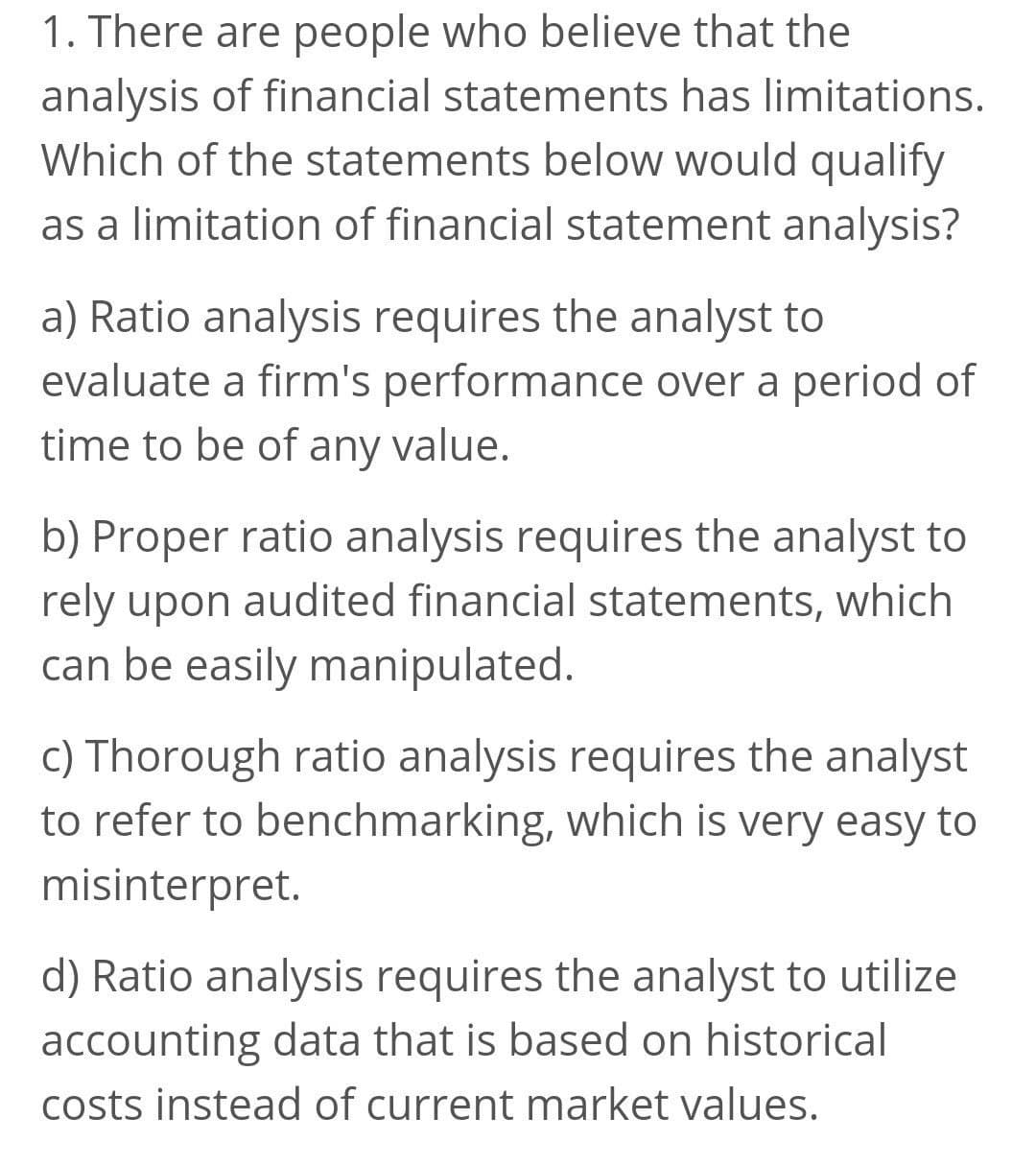1. There are people who believe that the analysis of financial statements has limitations. Which of the statements below would qualify as a limitation of financial statement analysis? a) Ratio analysis requires the analyst to evaluate a firm's performance over a period of time to be of any value. b) Proper ratio analysis requires the analyst to rely upon audited financial statements, which can be easily manipulated. c) Thorough ratio analysis requires the analyst to refer to benchmarking, which is very easy to misinterpret.
1. There are people who believe that the analysis of financial statements has limitations. Which of the statements below would qualify as a limitation of financial statement analysis? a) Ratio analysis requires the analyst to evaluate a firm's performance over a period of time to be of any value. b) Proper ratio analysis requires the analyst to rely upon audited financial statements, which can be easily manipulated. c) Thorough ratio analysis requires the analyst to refer to benchmarking, which is very easy to misinterpret.
Auditing: A Risk Based-Approach to Conducting a Quality Audit
10th Edition
ISBN:9781305080577
Author:Karla M Johnstone, Audrey A. Gramling, Larry E. Rittenberg
Publisher:Karla M Johnstone, Audrey A. Gramling, Larry E. Rittenberg
Chapter6: A Framework For Audit Evidence
Section: Chapter Questions
Problem 32MCQ
Related questions
Question
None

Transcribed Image Text:1. There are people who believe that the
analysis of financial statements has limitations.
Which of the statements below would qualify
as a limitation of financial statement analysis?
a) Ratio analysis requires the analyst to
evaluate a firm's performance over a period of
time to be of any value.
b) Proper ratio analysis requires the analyst to
rely upon audited financial statements, which
can be easily manipulated.
c) Thorough ratio analysis requires the analyst
to refer to benchmarking, which is very easy to
misinterpret.
d) Ratio analysis requires the analyst to utilize
accounting data that is based on historical
costs instead of current market values.
Expert Solution
This question has been solved!
Explore an expertly crafted, step-by-step solution for a thorough understanding of key concepts.
This is a popular solution!
Trending now
This is a popular solution!
Step by step
Solved in 2 steps

Knowledge Booster
Learn more about
Need a deep-dive on the concept behind this application? Look no further. Learn more about this topic, accounting and related others by exploring similar questions and additional content below.Recommended textbooks for you

Auditing: A Risk Based-Approach to Conducting a Q…
Accounting
ISBN:
9781305080577
Author:
Karla M Johnstone, Audrey A. Gramling, Larry E. Rittenberg
Publisher:
South-Western College Pub

Financial Reporting, Financial Statement Analysis…
Finance
ISBN:
9781285190907
Author:
James M. Wahlen, Stephen P. Baginski, Mark Bradshaw
Publisher:
Cengage Learning

Auditing: A Risk Based-Approach (MindTap Course L…
Accounting
ISBN:
9781337619455
Author:
Karla M Johnstone, Audrey A. Gramling, Larry E. Rittenberg
Publisher:
Cengage Learning

Auditing: A Risk Based-Approach to Conducting a Q…
Accounting
ISBN:
9781305080577
Author:
Karla M Johnstone, Audrey A. Gramling, Larry E. Rittenberg
Publisher:
South-Western College Pub

Financial Reporting, Financial Statement Analysis…
Finance
ISBN:
9781285190907
Author:
James M. Wahlen, Stephen P. Baginski, Mark Bradshaw
Publisher:
Cengage Learning

Auditing: A Risk Based-Approach (MindTap Course L…
Accounting
ISBN:
9781337619455
Author:
Karla M Johnstone, Audrey A. Gramling, Larry E. Rittenberg
Publisher:
Cengage Learning

Business/Professional Ethics Directors/Executives…
Accounting
ISBN:
9781337485913
Author:
BROOKS
Publisher:
Cengage